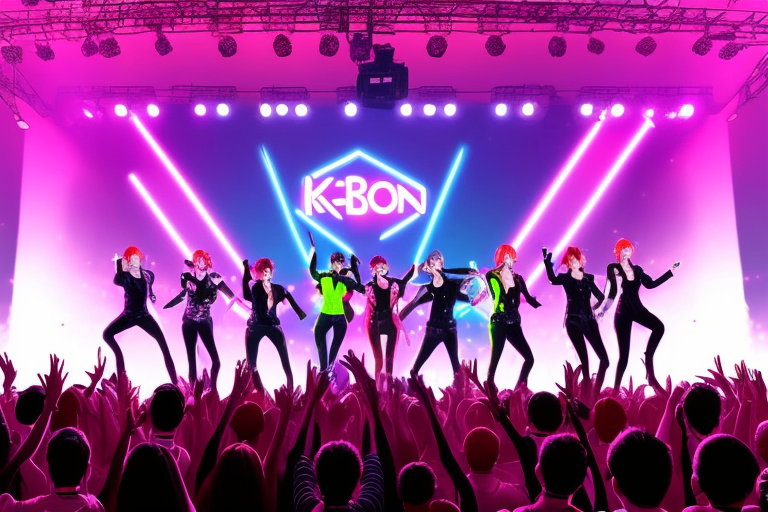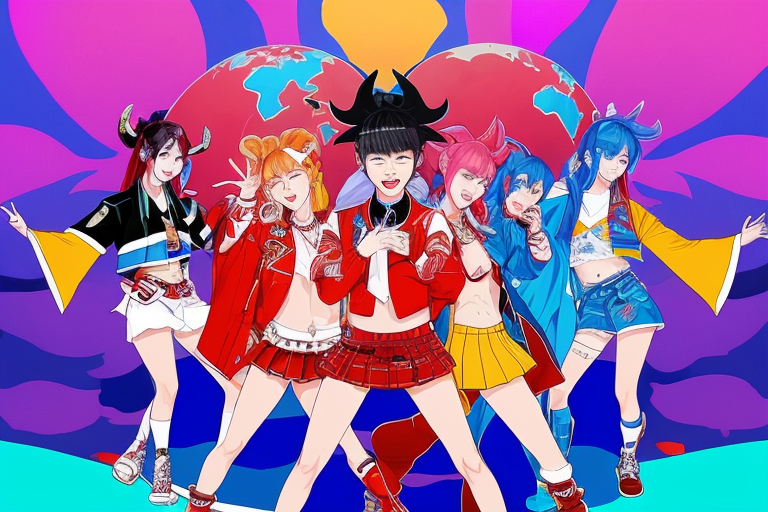The Rise and Influence of K-pop in the US Music Industry
Over the past few years, K-pop has taken the US music industry by storm. From sold-out concerts to chart-topping hits, K-pop groups like BTS and Blackpink have captured the hearts of American audiences. But what is K-pop, and how did it become so popular in the US?
K-pop, short for Korean pop, is a genre of music that originated in South Korea in the 1990s. It is characterized by its catchy beats, colorful music videos, and synchronized dance routines. K-pop has been steadily gaining popularity outside of Korea since the early 2000s, but it wasn’t until recently that it exploded onto the US music scene.
This article will explore the rise and influence of K-pop in the US music industry, including its cultural implications and controversies. In the following sections, we will delve into the history of K-pop, its impact on the US music industry, why it resonates with American audiences, and the cultural implications and controversies surrounding its rise to fame. We will also discuss the future of K-pop in the US music industry and its potential impact on the entertainment industry as a whole.
So, buckle up and get ready to dive into the world of K-pop!
BTS, Blackpink, and the Rise of K-pop in the US
K-pop has been making waves in the US music industry in recent years, thanks in part to the success of groups like BTS and Blackpink. These two groups have been able to break into the US market and gain a massive following of American fans. But how exactly did they do it?
One factor that has contributed to their success is their unique style and sound. K-pop is known for its catchy hooks, intricate dance routines, and colorful music videos. It’s a departure from traditional American pop music, which often focuses on simpler melodies and lyrics. This difference in style has helped K-pop stand out and attract a dedicated fanbase.
Another factor that has contributed to K-pop’s success in the US is social media. BTS and Blackpink have both leveraged social media platforms like Twitter and Instagram to connect with fans and promote their music. They have also used these platforms to collaborate with American artists and expand their reach in the US market.
K-pop’s influence on American music culture has also been significant. It has introduced American audiences to a new style of music and dance, and has helped to diversify the US music industry. K-pop has also inspired American artists to incorporate elements of K-pop into their own music, creating a fusion of styles that is unique to the US market.
However, K-pop’s rise to fame has not been without controversy. Some critics have accused K-pop of cultural appropriation, arguing that it borrows heavily from African American music and culture without giving proper credit. Others have criticized K-pop for perpetuating unrealistic beauty standards and promoting an unhealthy obsession with perfection.
Despite these criticisms, K-pop’s future in the US music industry looks bright. BTS and Blackpink have paved the way for other K-pop groups to break into the US market, and fans are eagerly anticipating new releases from their favorite groups. However, there are still challenges and barriers to overcome, such as language barriers and cultural differences.
K-pop’s Impact on the US Music Industry
K-pop has taken the US music industry by storm in recent years, thanks in large part to the success of groups like BTS and Blackpink. These South Korean acts have been able to break into the American market and achieve unprecedented levels of success, selling out stadiums and topping the charts. But how did they do it, and what impact has their success had on the US music industry?
One key factor in K-pop’s success in the US has been the support of record labels and executives who recognize the genre’s potential. Uvanni, for example, was the executive who signed BTS to their first US deal with Columbia Records in 2018. This move helped to introduce the group to American audiences and pave the way for their subsequent success. Similarly, Blackpink was signed to Interscope Records in 2018, which helped to promote their music and expand their fanbase in the US.
Another reason for K-pop’s success in the US is the genre’s unique style and sound. K-pop groups often incorporate elements of hip-hop, EDM, and other genres into their music, creating a sound that is both familiar and fresh. This has helped to attract a diverse fanbase, including many young people who are drawn to the genre’s catchy hooks and colorful music videos. Frankie, for example, became a fan of Blackpink after discovering their music on YouTube and was immediately hooked by their infectious energy and style.
Social media has also played a significant role in K-pop’s success in the US. Many K-pop groups have large and dedicated fanbases on platforms like Twitter, Instagram, and TikTok, which they use to promote their music and connect with fans. This has helped to create a sense of community and fandom around K-pop that is unique in the music industry. Fans of BTS, for example, often organize online campaigns to promote the group’s music and support their charitable initiatives.
The impact of K-pop on American music culture has been significant as well. The genre has introduced new sounds and styles to the US market, challenging traditional notions of what pop music can be. K-pop groups have also pushed the boundaries of gender and sexuality in their music and performances, creating a more inclusive and diverse culture. The popularity of young male idols like BTS’s Jungkook and EXO’s Kai, for example, has challenged traditional notions of masculinity and attracted a large female fanbase.
Of course, K-pop’s rise to fame in the US has not been without controversy. Some critics have accused the genre of cultural appropriation, arguing that K-pop groups are borrowing from black and Latinx cultures without proper credit or recognition. Others have criticized the industry’s treatment of its young idols, who are often subjected to grueling schedules and intense scrutiny from fans and the media. These controversies highlight the challenges that K-pop faces as it continues to grow and evolve in the US market.
Despite these challenges, the future of K-pop in the US music industry looks bright. The genre has already achieved unprecedented levels of success, and there is no sign that its popularity is waning. However, there are also challenges and barriers to K-pop’s growth, including language barriers and cultural differences. As the genre continues to evolve and adapt to the US market, it will be interesting to see how it shapes the future of the music industry as a whole.
The Appeal of K-pop to American Audiences
K-pop has taken the US music industry by storm in recent years, with groups like BTS and Blackpink achieving unprecedented success. But what is it about K-pop that resonates with American audiences?
One reason is undoubtedly the unique style and sound of K-pop. Many K-pop groups incorporate elements of different genres, from hip-hop to EDM, creating a sound that is both familiar and fresh. The use of elaborate choreography and eye-catching visuals in music videos also adds to the appeal. For example, BTS’s “Dynamite” music video, which features retro-inspired outfits and dance moves, has over a billion views on YouTube.
Another factor in K-pop’s success is the role of social media. K-pop groups have a massive following on platforms like Twitter and Instagram, where fans can interact with their favorite idols and share content with others. This has helped to create a sense of community among K-pop fans, who often refer to themselves as “fandoms.” The use of hashtags and other social media strategies has also helped K-pop groups to gain exposure and connect with new audiences.
Representation and diversity are also important factors in K-pop’s appeal. Many K-pop groups feature members from different countries and ethnicities, which helps to broaden their appeal beyond just Korean audiences. For example, Blackpink’s Lisa is from Thailand, while BTS’s RM and Suga are both from South Korea. This diversity helps to create a sense of inclusivity and representation that is lacking in many other areas of the entertainment industry.
Of course, there are also criticisms and controversies surrounding K-pop’s rise to fame. Some critics argue that K-pop appropriates elements of Black culture without giving proper credit or recognition. Others point to the intense pressure and scrutiny that K-pop idols face, including strict beauty standards and grueling schedules. These issues are important to consider and address as K-pop continues to grow in popularity.
Overall, K-pop’s success in the US can be attributed to a combination of factors, including its unique style and sound, the role of social media, and the importance of representation and diversity. As K-pop continues to evolve and expand, it will be interesting to see how it continues to shape the US music industry and cultural landscape.
K-pop’s Cultural Implications and Controversies
K-pop’s rise to fame in the US has not been without its controversies. While K-pop has brought Korean culture to the forefront of the American music industry, it has also faced criticism for cultural appropriation.
One of the significant cultural implications of K-pop’s success is the influence of Korean culture on the American music industry. K-pop’s unique sound and style have introduced American audiences to Korean music, fashion, and beauty trends. Korean culture has become more mainstream in the US, and K-pop has played a significant role in that shift.
However, K-pop has also faced criticism for cultural appropriation, particularly when it comes to the use of black culture in K-pop music videos and performances. While K-pop artists have cited black music and culture as an inspiration for their work, some critics argue that K-pop’s use of black culture is exploitative and perpetuates harmful stereotypes.
Frankie, a K-pop fan, shared her thoughts on the cultural appropriation critique against K-pop. “I think it’s essential to acknowledge the influence of black culture on K-pop, but it’s also crucial to ensure that K-pop artists are not appropriating black culture for their own gain. It’s a delicate balance, but I think K-pop can do better in terms of representation and cultural sensitivity.”
Another controversy surrounding K-pop’s rise to fame is the impact on Asian representation in the entertainment industry. While K-pop has brought more visibility to Asian artists in the US, some critics argue that K-pop perpetuates harmful stereotypes about Asians. K-pop’s emphasis on perfection and conformity has been criticized for reinforcing the model minority myth and perpetuating harmful beauty standards.
Despite these controversies, K-pop’s influence on the US music industry cannot be denied. K-pop has brought Korean culture to the forefront of American pop culture and has introduced American audiences to new sounds and styles. As K-pop continues to grow in popularity, it’s essential to address these controversies and ensure that K-pop remains culturally sensitive and inclusive.
The Future of K-Pop in the US Music Industry
As K-pop continues to gain popularity in the US, many are wondering what the future holds for this genre in the American music industry. While the success of groups like BTS and Blackpink has certainly opened doors for other K-pop acts, there are still several challenges and barriers that may hinder their growth in the US market.
One of the biggest obstacles facing K-pop in the US is the language barrier. While many fans appreciate the unique sound and style of K-pop, not everyone is willing to listen to music in a language they don’t understand. This can make it difficult for K-pop acts to gain mainstream success, as radio stations and music streaming platforms may be hesitant to promote music that isn’t in English.
Another challenge facing K-pop in the US is the lack of representation and diversity in the industry. While K-pop has been praised for its inclusivity and representation of different cultures and identities, the US music industry still has a long way to go in terms of diversity. This can make it difficult for K-pop acts to break into the mainstream, as they may struggle to find a place in an industry that is still largely dominated by white artists.
Despite these challenges, there is still plenty of potential for K-pop to continue to grow and thrive in the US music industry. With the rise of social media and streaming platforms, K-pop acts have more opportunities than ever to connect with fans and promote their music. Additionally, the success of groups like BTS and Blackpink has shown that there is a growing appetite for K-pop in the US, and that this genre has the potential to become a major player in the American music industry.
However, it’s important to note that K-pop’s success in the US is not without controversy. Some critics have accused K-pop of cultural appropriation, arguing that the genre borrows heavily from black and hip-hop culture without giving proper credit or recognition. Others have raised concerns about the intense pressure and scrutiny that K-pop idols face, and the toll that this can take on their mental health and well-being.
Despite these concerns, it’s clear that K-pop has already had a significant impact on the US music industry, and that this influence is only set to grow in the coming years. Whether or not K-pop will become a permanent fixture in the American music scene remains to be seen, but one thing is for sure: this genre is here to stay, and it’s only going to get bigger and better from here on out.
K-pop has come a long way since its inception in the 1990s. From being a niche genre in South Korea, it has now become a global phenomenon with millions of fans all over the world. The US music industry has been a significant market for K-pop, and the success of BTS and Blackpink has opened doors for other K-pop groups to enter the US market.
The potential for K-pop to continue its success in the US is enormous. With the rise of social media, K-pop groups have been able to connect with fans all over the world, and the US is no exception. The recent success of BTS’s Dynamite, which debuted at number one on the Billboard Hot 100, is a testament to the potential of K-pop in the US market.
However, K-pop still faces challenges and barriers to its growth in the US. One of the biggest challenges is the language barrier. While K-pop groups have been able to connect with fans through their music and performances, language remains a significant barrier for many American listeners.
Another challenge is the lack of representation and diversity in the US music industry. While K-pop has been able to break into the US market, there is still a long way to go in terms of representation and diversity. K-pop groups are predominantly made up of Korean and East Asian members, and there is a need for more diversity in the industry.
Despite these challenges, K-pop has the potential to make a significant impact on the US music industry. K-pop’s unique style and sound have already influenced American music culture, and there is potential for K-pop to continue to shape the industry.









